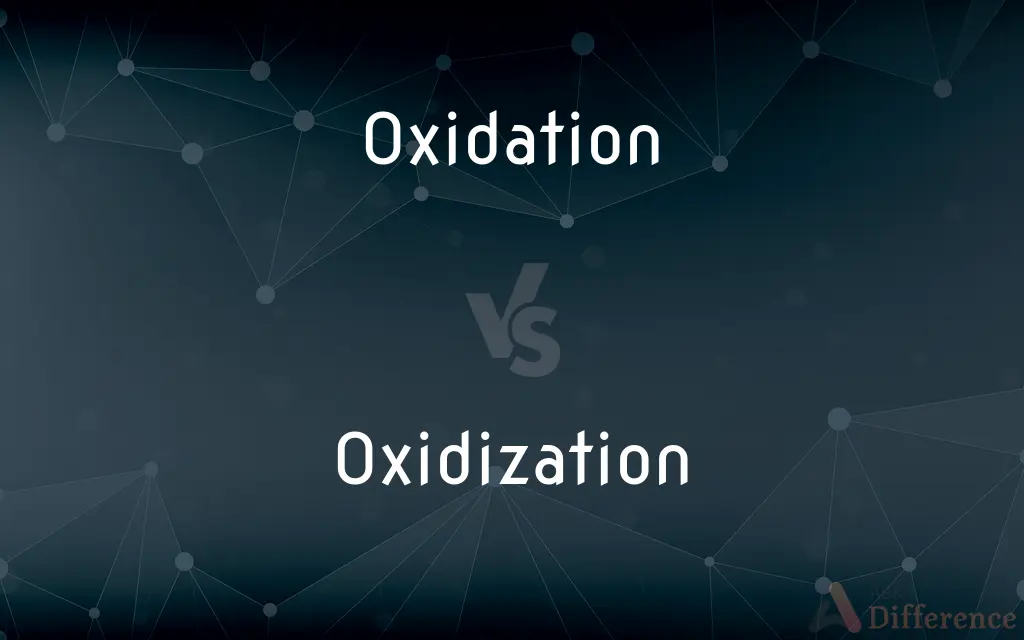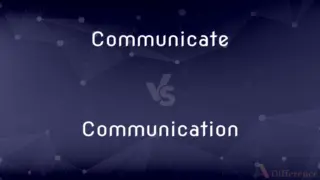Oxidation vs. Oxidization — What's the Difference?
By Tayyaba Rehman — Updated on December 22, 2023
"Oxidation" and "Oxidization" essentially refer to the same chemical process, where a substance loses electrons or increases its oxidation state, often involving oxygen. The "oxidation" being more commonly used.

Difference Between Oxidation and Oxidization
Table of Contents
ADVERTISEMENT
Key Differences
Oxidation is a chemical process in which a substance loses electrons to another substance or increases its oxidation state, often involving the addition of oxygen. Oxidization is an alternative term for the same process, primarily differing in linguistic preference rather than meaning or application.
The term oxidation is widely used in scientific literature and education, particularly in chemistry, to describe a process integral to numerous chemical reactions, including combustion and rusting. Oxidization, while technically correct, is less commonly used and may be seen more in varied regional or colloquial contexts.
In oxidation, the substance that loses electrons (or gains oxygen) is said to be oxidized. This term is universally recognized and used in academic and professional settings. The term oxidization conveys the same concept but is less prevalent in scientific discourse.
Oxidation is a fundamental concept in understanding redox (reduction-oxidation) reactions, which are key in fields like biochemistry, environmental science, and industrial processes. While oxidization refers to the same reactions, its usage is less frequent in these specialized fields.
In terms of language evolution and usage, oxidation has a more established presence in textbooks, scientific papers, and educational materials. Oxidization, though understood, may be considered a less standard or alternative form of the term, often dependent on regional language variations.
ADVERTISEMENT
Comparison Chart
Definition
Loss of electrons/increase in oxidation state
Same as oxidation
Common Usage
Widely used in scientific literature and education
Less commonly used, more in regional contexts
Contexts
Academic, professional, scientific discourse
Varied, including colloquial and regional use
Prevalence
More established in textbooks and scientific papers
Less prevalent in formal scientific discourse
Regional Preference
Universal usage
Possible regional variation
Compare with Definitions
Oxidation
Oxidation is often associated with corrosion and combustion.
The oxidation of metals in the presence of moisture leads to corrosion.
Oxidization
Oxidization is the process where a substance loses electrons, identical to oxidation.
The oxidization of copper over time gives it a green patina.
Oxidation
Oxidation is the loss of electrons during a chemical reaction.
In the reaction, the iron underwent oxidation to form rust.
Oxidization
Oxidization is involved in various chemical and biological processes.
The oxidization of nutrients is critical for cellular metabolism.
Oxidation
In oxidation, a substance's oxidation state increases.
The oxidation of hydrogen in a fuel cell generates electricity.
Oxidization
In oxidization, there is an increase in the oxidation number of the substance.
The oxidization of sulfur dioxide produces sulfur trioxide.
Oxidation
Oxidation is a key part of redox reactions.
Oxidation and reduction processes are essential in battery operation.
Oxidization
Oxidization can mean the reaction of a substance with oxygen.
The slow oxidization of wood is part of its natural decay process.
Oxidation
Oxidation can involve the addition of oxygen to a substance.
The oxidation of glucose in the body releases energy.
Oxidization
To combine with oxygen; make into an oxide.
Oxidation
The process or result of oxidizing or being oxidized.
Oxidization
To increase the positive charge or valence of (an element) by removing electrons.
Oxidation
The combination of a substance with oxygen.
Oxidization
To coat with oxide.
Oxidation
A reaction in which the atoms of an element lose electrons and the valence of the element is correspondingly increased.
Oxidization
To become oxidized.
Oxidation
The combination of a substance with oxygen.
Oxidization
Oxidation
Oxidation
(chemistry) A reaction in which the atoms of an element lose electrons and the oxidation state of the element increases.
Oxidization
The process of oxidizing; the addition of oxygen to a compound with a loss of electrons. The process always occurs accompanied by reduction.
Oxidation
The act or process of oxidizing, or the state or result of being oxidized.
Oxidization
The process of oxidizing; the addition of oxygen to a compound with a loss of electrons; always occurs accompanied by reduction
Oxidation
The process of oxidizing; the addition of oxygen to a compound with a loss of electrons; always occurs accompanied by reduction
Oxidization
Oxidization can also refer to corrosion and rusting.
Iron oxidization is commonly seen as rust on exposed metal surfaces.
Common Curiosities
Is oxidation always associated with oxygen?
Often, but it can also occur with other substances where electrons are lost.
Are oxidation and oxidization interchangeable in chemistry?
Yes, they can be used interchangeably, though "oxidation" is more common.
Is rusting an example of oxidation or oxidization?
Rusting is an example of both, as they refer to the same process.
Is oxidation important in biological systems?
Yes, it's crucial in cellular respiration and energy production.
Is oxidation harmful to the human body?
Oxidative stress can be harmful, but oxidation is also vital for cellular function.
Does oxidation always result in a negative effect like corrosion?
Not always. Oxidation is also essential in beneficial processes like metabolism.
Are there industries that rely on oxidization?
Yes, industries like energy and waste management utilize oxidization processes.
Can oxidization occur without oxygen?
Yes, any electron loss process is considered oxidization, even without oxygen.
Can oxidization be controlled or prevented?
Yes, through methods like coating, inhibitors, and material selection.
Do oxidation and oxidization have the same speed?
Yes, they refer to the same chemical process and thus have the same rate.
Is oxidation a type of chemical reaction?
Yes, it's a fundamental type of chemical reaction.
Is oxidization a spontaneous process?
It can be, depending on the substances involved and environmental conditions.
Are antioxidants related to oxidation?
Yes, antioxidants help prevent damage caused by oxidative processes.
Does oxidation affect the taste of food and drinks?
Yes, it can change flavors, often negatively, as in rancid fats or stale beer.
Can oxidization be reversed?
In some cases, through reduction, the opposite process.
Share Your Discovery

Previous Comparison
Communicate vs. Communication
Next Comparison
Caroller vs. CarolerAuthor Spotlight
Written by
Tayyaba RehmanTayyaba Rehman is a distinguished writer, currently serving as a primary contributor to askdifference.com. As a researcher in semantics and etymology, Tayyaba's passion for the complexity of languages and their distinctions has found a perfect home on the platform. Tayyaba delves into the intricacies of language, distinguishing between commonly confused words and phrases, thereby providing clarity for readers worldwide.















































